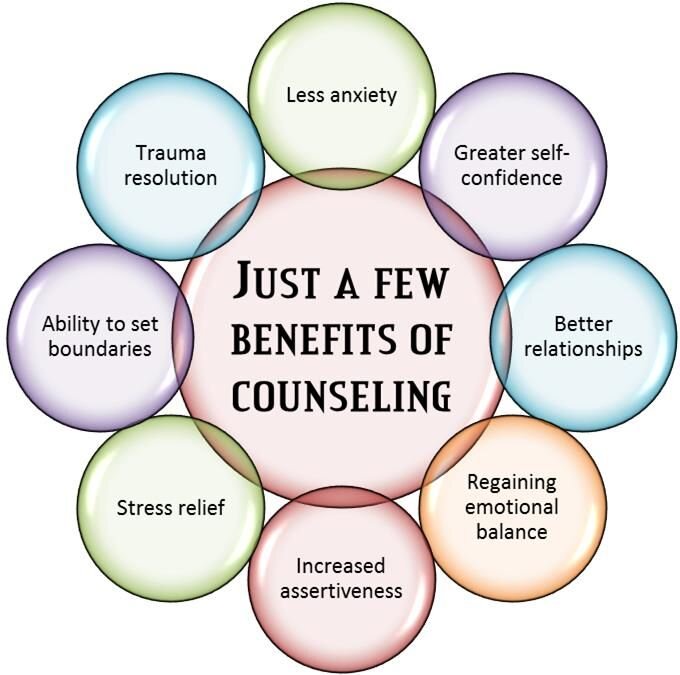5 Overlooked Mental Health Resources That Can Make a Big Difference
The Value of Mental Health: a Deep Study Counseling, Treatment, and Their Advantages
Mental wellness significantly forms specific wellness, impacting thoughts, feelings, and behaviors. Therapy and therapy act as crucial avenues for healing and personal development. They offer structured assistance, assisting people navigate life's obstacles. Many remain not aware of the details kinds of treatment offered and their unique benefits. Understanding these elements is essential for anyone thinking about expert mental health and wellness support. What complies with may light up courses to resilience and satisfaction that many ignore.
Recognizing Mental Health and Its Impact
Psychological health and wellness is commonly neglected, it plays a crucial duty in overall health and everyday performance - Couples Therapy. It includes psychological, psychological, and social aspects that influence how people think, feel, and behave. An individual's psychological health and wellness straight affects their capacity to manage stress and anxiety, connect to others, and choose. Poor mental wellness can bring about various issues, consisting of stress and anxiety, anxiety, and trouble in keeping connections, all of which can impede individual and specialist growth.Furthermore, psychological health and wellness has far-reaching ramifications for physical health. Persistent anxiety and unattended mental problems can add to various physical ailments, such as heart disease and weakened immune actions. Conversely, positive psychological health promotes resilience, making it possible for individuals to manage life's difficulties effectively. Understanding mental wellness's importance is essential for fostering helpful settings that promote psychological health, therefore improving the lifestyle for individuals and neighborhoods alike
The Different Kinds Of Counseling and Treatment
In the domain name of mental wellness, various therapy and therapy types satisfy diverse requirements. Private counseling strategies concentrate on personal concerns through individually sessions, while team treatment characteristics foster shared experiences and assistance amongst individuals. Comprehending these modalities is crucial for choosing the appropriate intervention for different difficulties.
Private Counseling Strategies
Numerous individual therapy methods exist, each developed to attend to particular psychological health problems and deal with differing customer needs. Cognitive Behavioral Therapy (CBT) focuses on recognizing and transforming negative thought patterns, while Psychodynamic Therapy discovers past experiences and unconscious procedures. Humanistic Therapy highlights personal development and self-actualization, cultivating a supportive environment. Social Treatment (IPT) targets partnership problems and interaction patterns to boost psychological well-being. Additionally, Approval and Commitment Treatment (ACT) urges customers to accept their ideas and feelings while devoting to individual values. Each approach provides unique strategies and ideologies, permitting specialists to customize their techniques to the person, thereby enhancing the restorative experience and advertising psychological wellness healing.
Group Therapy Characteristics
Team treatment dynamics incorporate numerous restorative methods that take advantage of the power of social connections and common experiences. This type of treatment typically consists of diverse teams, cultivating a safe atmosphere for participants to reveal ideas and feelings. Trick types of team therapy include support system, which provide psychological assistance; process-oriented teams, concentrating on social communications; and psychoeducational groups, focused on imparting knowledge regarding mental wellness problems. The characteristics within these teams can boost self-awareness, as members frequently assess their habits in connection with others. Additionally, team therapy fosters a feeling of belonging, reducing feelings of seclusion. With shared stories and collective problem-solving, individuals can develop coping techniques and obtain understandings, ultimately adding to specific growth and healing.
The Duty of Counseling in Mental Health And Wellness
Counseling plays a crucial duty in mental wellness by providing different methods tailored to private requirements. These techniques supply specialist guidance that can cause significant enhancements in emotional wellness. Comprehending the various sorts of counseling can help individuals make informed decisions concerning their mental healthcare.

Sorts Of Counseling Techniques
While various counseling techniques exist, each offers special methodologies and understandings into mental health therapy - Cognitive Behavioural Therapy. Amongst one of the most popular are cognitive-behavioral treatment (CBT), which concentrates on altering unfavorable idea patterns; psychodynamic treatment, which discovers unconscious procedures and childhood experiences; and humanistic methods, highlighting individual development and self-actualization. Additionally, solution-focused brief therapy prioritizes locating solutions in the here and now instead than diving into troubles. Team therapy cultivates area and shared experiences, while family treatment addresses relational characteristics within domestic frameworks. Each approach satisfies various needs, aligning with individual preferences, problems, and healing objectives. Recognizing these methods aids customers make informed choices about their psychological wellness trip and advertises effective treatment customized to their one-of-a-kind circumstances
Benefits of Expert Assistance
Numerous individuals take advantage of expert assistance in handling their mental health obstacles. Therapy uses a risk-free room for clients to discover their thoughts and sensations without judgment. This therapeutic setting cultivates self-awareness, allowing people to determine patterns in their actions and create healthier coping techniques. Expert advice also gives accessibility to evidence-based strategies that can alleviate signs of anxiousness, anxiety, and other site mental health and wellness concerns. In addition, therapists can help in setting practical goals and offer assistance in attaining them, enhancing total well-being. The collaborative connection in between counselor and client is essential, as it advertises responsibility and urges personal growth. Inevitably, specialist support plays a vital function in guiding mental wellness journeys, causing boosted psychological strength and life contentment.
Advantages of Treatment: Recovery and Growth
:max_bytes(150000):strip_icc()/GettyImages-554392669-56a6c32d3df78cf7728feb74.jpg)
Just how to Choose the Right Therapist or Therapist
Just how can one browse the usually overwhelming procedure of picking the right therapist or therapist? Identifying individual demands is important; individuals should consider their specific concerns, whether anxiousness, partnership, or depression challenges. It is valuable to study various therapeutic techniques, such as cognitive-behavioral treatment or psychodynamic therapy, to find a suitable match.Next, potential clients should seek recommendations from trusted sources or use on-line directory sites. It is essential to evaluate therapists' credentials, including their education, licensing, and locations of field of expertise. Scheduling first examinations can assist evaluate compatibility, enabling individuals to assess communication styles and individual comfort.Finally, logistical elements, such as location, availability, and costs, must likewise be considered. By attentively weighing these aspects, one can make a notified decision, inevitably promoting a restorative relationship that supports psychological health and personal development.
Overcoming Preconception: Accepting Mental Health Assistance
While social perspectives towards psychological health and wellness have actually developed, preconception still provides a visit our website considerable barrier for lots of seeking assistance. This preconception typically shows up as mistaken beliefs bordering mental health problem, leading people to really feel pity or anxiety regarding their battles. Lots of people are reluctant to go after therapy or treatment because of worries concerning being judged or identified. Overcoming this preconception is fundamental for promoting an encouraging atmosphere where individuals can freely discuss their mental health and wellness needs.Communities and organizations play an essential function in this makeover by promoting awareness and education and learning regarding psychological health and wellness issues. Initiatives that highlight personal stories can humanize these experiences, encouraging others to seek aid without anxiety. As acceptance expands, people may really feel much more equipped to embrace psychological health support, identifying it as a vital aspect of general health. By taking down preconception, culture can cultivate a culture of understanding, compassion, and proactive psychological wellness care.
Methods for Preserving Psychological Wellness Outside of Therapy
Although therapy offers important support, keeping psychological wellness outside of sessions is similarly vital. People can implement numerous techniques to sustain their mental health. Routine exercise plays a crucial function, as workout promotes the release of endorphins, which enhance mood. Additionally, a balanced diet plan rich in nutrients can significantly affect psychological security and energy levels.Practicing mindfulness and meditation aids individuals take care of stress and anxiety and establish greater self-awareness. Developing a constant rest regimen is also basic, as quality remainder is critical for cognitive function and emotional regulation.Engaging in social tasks fosters link and decreases sensations of seclusion. Going after hobbies or rate of interests can supply an innovative outlet and increase self-worth. Finally, establishing reasonable goals and exercising self-compassion permits people to grow strength. By integrating these approaches into day-to-day life, people can successfully sustain their mental well-being beyond therapy sessions.
Frequently Asked Concerns

Just How Can I Inform if I Need Treatment?

Identifying the requirement for therapy usually includes identifying consistent feelings of unhappiness, stress and anxiety, or frustrating tension. If day-to-day functioning comes to be challenging or coping mechanisms fail, seeking expert assistance may be an advantageous advance.
What Should I Expect in My Initial Therapy Session?
In the initial therapy session, people can expect an introduction, conversation of their factors for looking for help, and an overview of the therapist's approach, creating a structure for future discussions and establishing comfort in the healing space.
Are Online Therapy Procedure as Effective as In-Person Ones?
Research suggests that online therapy sessions can be as reliable as in-person ones. Factors such as the therapist's credentials, customer involvement, and the restorative relationship significantly affect end results, despite the tool made use of.
Can Treatment Assist With Relationship Issues?
Therapy can aid people in addressing relationship issues by offering devices for communication, understanding feelings, and settling disputes. Cognitive Behavioural Therapy. It promotes much healthier dynamics and encourages personal development, ultimately promoting more powerful, a lot more satisfying links in between partners
For How Long Does Treatment Commonly Last?
Treatment period differs substantially based upon specific requirements and goals. Typically, sessions might last from a couple of weeks to a blog number of months, with some individuals taking part in continuous therapy to resolve long-lasting concerns and individual development. Cognitive Behavioral Treatment (CBT) focuses on determining and changing unfavorable thought patterns, while Psychodynamic Treatment checks out subconscious procedures and previous experiences. Trick kinds of team therapy consist of support teams, which offer psychological support; process-oriented groups, focusing on interpersonal communications; and psychoeducational teams, intended at presenting knowledge regarding mental wellness issues. Amongst the most popular are cognitive-behavioral treatment (CBT), which focuses on changing negative idea patterns; psychodynamic therapy, which discovers subconscious processes and youth experiences; and humanistic techniques, emphasizing personal development and self-actualization. Team therapy fosters community and shared experiences, while family therapy addresses relational dynamics within domestic structures. It is advantageous to research various healing methods, such as cognitive-behavioral treatment or psychodynamic treatment, to discover a suitable match.Next, prospective customers need to seek recommendations from relied on resources or utilize on the internet directory sites.